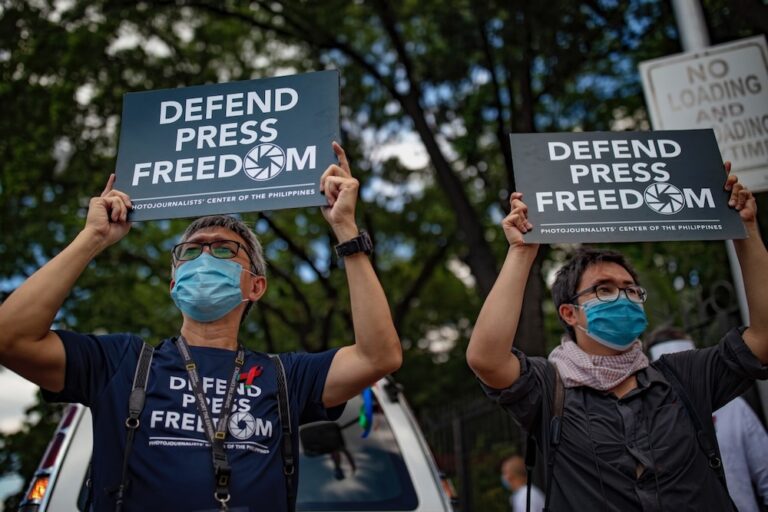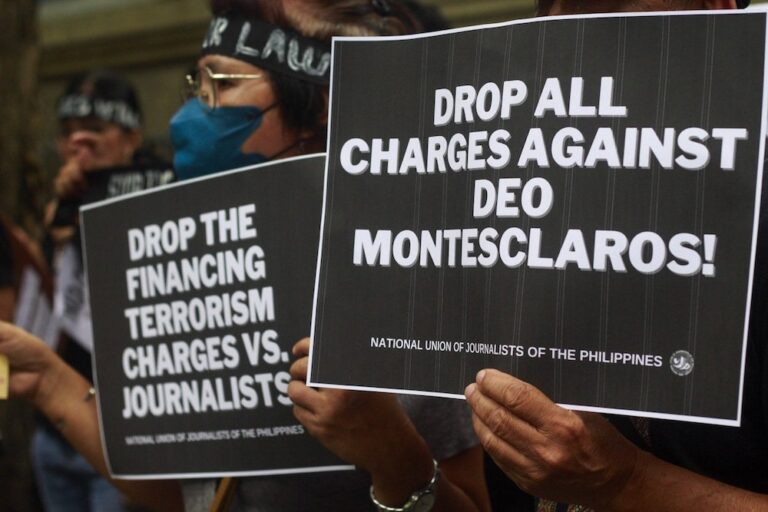(CMFR/IFEX) – A Regional Trial Court (RTC) judge in Cebu City, Cebu province, issued arrest warrants on 4 February 2008 for the two alleged masterminds behind the killing of journalist Marlene Esperat. Cebu is a province approximately 562 kilometres south of Manila. Cebu City RTC Branch 7 Judge Simeon Dumdum issued warrants of arrest to […]
(CMFR/IFEX) – A Regional Trial Court (RTC) judge in Cebu City, Cebu province, issued arrest warrants on 4 February 2008 for the two alleged masterminds behind the killing of journalist Marlene Esperat. Cebu is a province approximately 562 kilometres south of Manila.
Cebu City RTC Branch 7 Judge Simeon Dumdum issued warrants of arrest to the Cotabato City police. Suspects Estrella Sabay and Osmeña Montaner, Department of Agriculture (DA) Region 12 office finance officer and regional accountant, respectively, reside in Cotabato.
Esperat, who was a radio “blocktimer” and a columnist for the Sultan Kudarat province newspaper “The Midland Review”, was killed in 2005. “Blocktimers” buy radio airtime to run their own programmes.
Esperat, also known as “Madame Witness”, was also president of the Tri-Media Association in her provincial region due to her numerous media exposés. During her employment in the DA Region 12 from 1987 to 2004, she wrote about numerous cases of graft and corruption allegedly committed by public officials, involving misuse of public funds intended for the use of farmers.
Esperat was killed on 24 March 2005 while having supper with her children in their house in Tacurong city, Sultan Kudarat province. The case was transferred from Tacurong to Cebu because of safety concerns for the witnesses and to ensure a more neutral court hears the case.
Esperat had labeled Sabay and Montaner as “corrupt” DA officials.
Nena Santos, the private prosecutor for the prosecution, said that the issuance of the warrants was a “positive development”.
“The prosecution will face a legal battle against the moneyed and influential accused, but we believe that at the end of the day, truth and justice will prevail,” Santos added.
The information gathered from the preliminary investigation of the case was filed at the Cebu City RTC on 1 February 2008.
“I have personally examined the complaint and their witness, and on the basis of their sworn statements and other evidence presented before me, there is reasonable ground to believe that the offense charged has been committed and the accused are probably guilty,” wrote Geronimo Sy, the state prosecutor who conducted the preliminary investigation.
Through the assistance of the Freedom Fund for Filipino Journalists (FFFJ), Valmi Garcia Mariveles, Esperat’s sister, filed a complaint at the Department of Justice (DOJ) on 13 September 2007 against alleged masterminds Montaner and Sabay. The CMFR is a founding member and serves as the secretariat of the FFFJ.
In her petition to the DOJ, Mariveles wrote that the reinstatement of the case against the masterminds would “help to dispel the mistaken notion that it is government’s official policy to perpetuate a culture of impunity in the extrajudicial killing of journalists in our country”.
On 6 October 2006, Randy Grecia, Gerry Cabayag and Estanislao Bismanos were convicted by Judge Eric Menchavez of Cebu City RTC and sentenced to life imprisonment for the killing of Esperat. Rowie Barua, who was the coordinator for the alleged gunmen, turned into a state witness.
The case against Montaner and Sabay has been twice dismissed. Tacurong City RTC Judge Francis Palmones, who initially handled the case before the FFFJ petitioned for the case’s transfer to Cebu, first dismissed the case against Sabay and Montaner without a hearing, stating that the complaint had no probable cause. After the case against the alleged masterminds was filed again at Cebu, it was dismissed by Menchavez because of legal technicalities in the filing date.
Seventy journalists/media practitioners have been killed in the line of duty in the Philippines since 1986. No mastermind has ever been successfully prosecuted for any of the cases.


